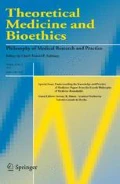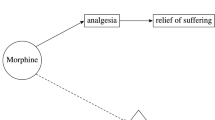Abstract
This special issue of Theoretical Medicine and Bioethics takes up the question of palliative sedation as a source of potential concern or controversy among Christian clinicians and thinkers. Christianity affirms a duty to relieve unnecessary suffering yet also proscribes euthanasia. Accordingly, the question arises as to whether it is ever morally permissible to render dying patients unconscious in order to relieve their suffering. If so, under what conditions? Is this practice genuinely morally distinguishable from euthanasia? Can one ever aim directly at making a dying person unconscious, or is it only permissible to tolerate unconsciousness as an unintended side effect of treating specific symptoms? What role does the rule of double effect play in making such decisions? Does spiritual or psychological suffering ever justify sedation to unconsciousness? What are the theological and spiritual aspects of such care? This introduction describes how the authors in this special issue wrestle with such questions and shows how each essay relates to the author’s individual position on palliative sedation, as developed in greater detail within his contribution.
Similar content being viewed by others
References
Sulmasy, Daniel P. 2013. Religion and bioethics: Towards pluralistic democratic deliberation. In Bioética e religiões, 27–44. Lisbon: Fundação Luso-Americana para o Desenvolvimento/Conselho Nacional de Ética para as Ciências da Vida.
Rawls, John. 1997. The idea of public reason revisited. University of Chicago Law Review 64: 765–807.
Habermas, Jürgen. 2006. Religion in the public sphere. European Journal of Philosophy 14: 1–25.
Aristotle. 1999. Nicomachean ethics. 2nd ed. Trans. Terence Irwin. Indianapolis: Hackett.
Byock, Ira. 1997. Dying well: The prospect for growth at the end of life. New York: Riverhead.
Dees, Marianne K., Myrra J. Vernooij-Dassen, Wim J. Dekkers, Kris C. Vissers, and Chris van Weel. 2011. ‘Unbearable suffering’: A qualitative study on the perspectives of patients who request assistance in dying. Journal of Medical Ethics 37: 727–734.
Author information
Authors and Affiliations
Corresponding author
Rights and permissions
About this article
Cite this article
Sulmasy, D.P. Sedation and care at the end of life. Theor Med Bioeth 39, 171–180 (2018). https://doi.org/10.1007/s11017-018-9441-4
Published:
Issue Date:
DOI: https://doi.org/10.1007/s11017-018-9441-4




